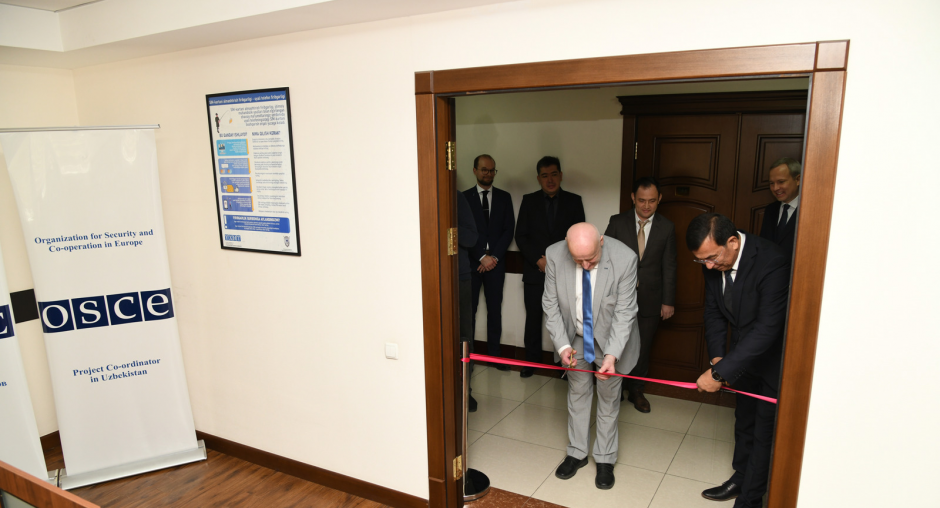Law enforcement representatives from the General Prosecutor’s Office, the Ministry of Internal Affairs and the State Security Service of Uzbekistan attended an OSCE training course on cryptocurrencies and Dark Web investigations in Tashkent from 17 to 21 October. The course was organized by the OSCE Transnational Threats Department in close co-operation with the OSCE Project Co-ordinator in Uzbekistan and the Academy of the General Prosecutor’s Office of the Republic of Uzbekistan.
Participants learned about the main concepts and key trends in the areas of internetworking, anonymity and encryption, cryptocurrencies, obfuscation techniques, Dark Web, and Tor networks. They also practiced approaches and methods for cryptocurrency seizing, blockchain analysis, and searching on the Dark Web. The course was based on materials developed by the European Cybercrime Training and Education Group (ECTEG).
Prior to the event, Erkin Yuldashev, Deputy General Prosecutor of Uzbekistan, and Hans-Ulrich Ihm, Acting OSCE Project Co-ordinator in Uzbekistan, officially inaugurated a new computer classroom donated to the General Prosecutor’s Academy by the OSCE.
Evgeniy Kolenko, Head of the Academy, said: “Digital technologies have been transforming criminal landscape and educating law enforcement in this area requires a long-term and systematic approach. Our Academy aspires to become the leading institution on cybercrime education for the criminal justice actors in Uzbekistan”.
Gayrat Musaev, Head of the Academy’s Department for Implementation of Information and Communication Technologies and Information Security, added: “Cybercrime education requires adequate equipment – both hardware and software – and up-to-date methodological materials for lecturers. The new Dark Web Lab that we inaugurated today provides an excellent technical basis for our future training”.
The course was the first national training in Uzbekistan delivered within the second phase of the “Capacity Building on Combating Cybercrime in Central Asia” extra-budgetary project, which is funded by the United States of America, Germany, and the Republic of Korea. National training activities will continue across the region throughout 2022 and 2023.
Read More: news.google.com









 Bitcoin
Bitcoin  Ethereum
Ethereum  Tether
Tether  XRP
XRP  Solana
Solana  USDC
USDC  Dogecoin
Dogecoin  TRON
TRON  Cardano
Cardano  Lido Staked Ether
Lido Staked Ether  Wrapped Bitcoin
Wrapped Bitcoin  LEO Token
LEO Token  Avalanche
Avalanche  Chainlink
Chainlink  Stellar
Stellar  Sui
Sui  Shiba Inu
Shiba Inu  USDS
USDS  Hedera
Hedera  Toncoin
Toncoin  Bitcoin Cash
Bitcoin Cash  Wrapped stETH
Wrapped stETH  MANTRA
MANTRA  Litecoin
Litecoin  Polkadot
Polkadot  Hyperliquid
Hyperliquid  Binance Bridged USDT (BNB Smart Chain)
Binance Bridged USDT (BNB Smart Chain)  Bitget Token
Bitget Token  Pi Network
Pi Network  Ethena USDe
Ethena USDe  WETH
WETH  WhiteBIT Coin
WhiteBIT Coin  Monero
Monero  Wrapped eETH
Wrapped eETH  Uniswap
Uniswap  OKB
OKB  Dai
Dai  Coinbase Wrapped BTC
Coinbase Wrapped BTC  Aptos
Aptos  Pepe
Pepe  Ondo
Ondo  Gate
Gate  Tokenize Xchange
Tokenize Xchange  NEAR Protocol
NEAR Protocol  sUSDS
sUSDS  Internet Computer
Internet Computer  BlackRock USD Institutional Digital Liquidity Fund
BlackRock USD Institutional Digital Liquidity Fund  Cronos
Cronos  Mantle
Mantle